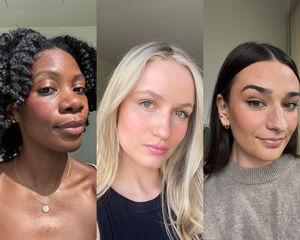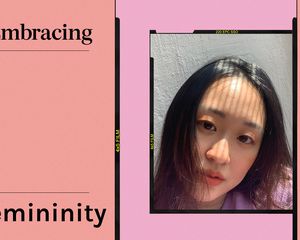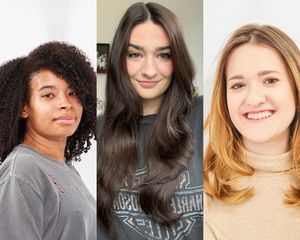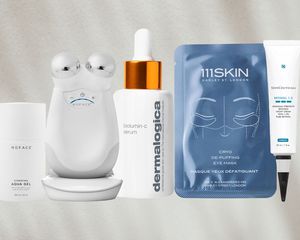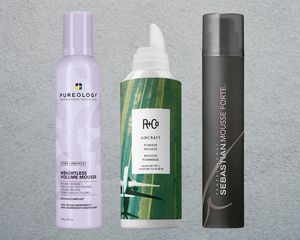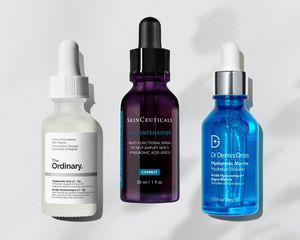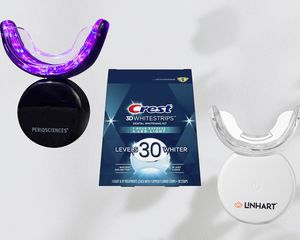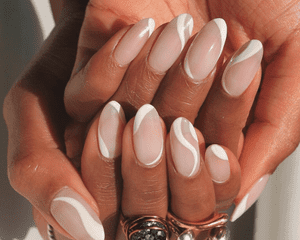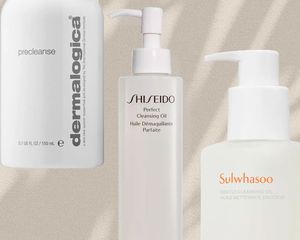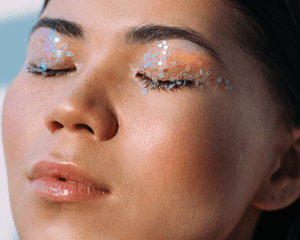Today, Clark's Botanicals is revered for its plant-powered skincare products. But if you were to time travel back to the late '90s or early aughts and ask Francesco Clark about his "dream job," beauty brand founder wouldn't have come up in conversation. Instead, he would have told you why he wanted to become a diplomat. In fact, he shaped his college curriculum to prepare him for a life overseas. Clark attended Johns Hopkins University, double majoring in international relations and romance languages. After passing the Foreign Service Officer Test, Clark's career in diplomacy was within reach. But his family's fears about his safety abroad swayed him to pursue other interests.
Clark's transition into fashion was a whirlwind, with equal parts grind and glamour. He established his footing in the industry as the assistant special projects director at the now-shuttered Mademoiselle magazine. "I was going to movie premieres, covering the Golden Globes, picking the [talent] on the front cover, and taking a deep dive into the business of Hollywood with magazines," he tells me. "I thought that was an amazing opportunity, and it helped me understand how to market a product in the right way." Clark's fashion prowess continued to develop, and he was soon recruited to fashion assistant at Harper's Bazaar. There, he got to assist on shoots with supermodels like Alek Wek and attend monumental moments like the first Victoria's Secret fashion show.
:max_bytes(200000):strip_icc()/skincare-embedded-vert-8cd833d67dc54d93b73dcffac6af23f6.jpg)
Byrdie / Francesco Clark
In 2002, Clark was promoted to a top PR firm at 24 years-old. Wanting to celebrate his career's upward trajectory, he headed to a beach house in the Hamptons to spend Memorial Day weekend with friends. "That was a time in my life when I was really proving myself as an adult (to myself and also to my family)," Clark says. "You feel invincible when you're 24, 23, or 22. You think the future is limitless. That's what it felt like to me."
But, everything changed in the blink of an eye. On the first night of vacation, Clark decided to go for a swim. He accidentally dove in at the shallow end of the pool, and his chin forcefully collided with the pool's floor. At that moment, Clark shattered his C3 and C4 vertebrae, leaving him paralyzed. "My life changed so quickly," Clark says, recounting the thoughts running through his mind 19 years ago. "But at the same time, when I was lifted out of the pool, I was looking up at the sky, and there wasn't a cloud in the sky. It was beautiful. You could see the stars, and it didn't make sense. How could it be such a beautiful day and the worst thing that could ever happen just happened?"
Following the accident, Clark felt his life was placed on pause. He watched his peers get engaged, receive promotions, and buy their first homes as he struggled to adjust to his new reality. "In the beginning, I didn't know what I could do on my own," he shares. "I couldn't move my arms. I couldn't speak very well because my vocal cord was paralyzed. I couldn't breathe very well because my left lung had collapsed. Even reaching for a glass of water, I couldn't do that anymore." Clark battled with depression for about three years as he came to terms with his spinal cord injury. But with time, he got to a place where he was ready to focus on rebuilding his sense of self.
"I couldn't look in the mirror for three years because if I did, all I would notice was the wheelchair," Clark says. "But then I realized I wanted to see other people, and I wanted to speak with other people. I started looking at myself in the mirror because I wanted to present myself in the way that I felt. I wanted to look confident. I wanted to look happy."
A significant part of Clark's quest to regain self-confidence involved skincare. His spinal cord injury prevented his skin from sweating and reacting to temperature, which affected how his skin looked and felt. "My skin and my complexion did not look like me," he says. "Anything and everything that could go wrong with my skin did." Clark's first course of action was to try different skincare products on the market, spanning prestige to prescription to drugstore. But nothing yielded the results he desired. That's when he turned to his father, a medical and homeopathic doctor, to help find a solution. "I talked to my dad, and I said, 'You have to help me because my skin doesn't look good, and I am ready to be more social,'" Clark says.
Byrdie / Francesco Clark
From there, the two focused their efforts on researching the skincare benefits of various vitamins and reading medical articles on ingredients that are immunostimulating for the skin. Taking the knowledge they gained, Clark and his father began developing a four-ingredient blend known as the Jasmine Catalyst Complex—a formula that Clark says finally brought the glow back to his skin. They then developed what is today called the Smoothing Marine Cream. However, at this stage, the idea of turning his efforts into a skincare company was still not something on his radar.
That all changed in 2010, after Harper's Bazaar's former Editor-in-Chief Glenda Bailey asked Clark to meet with her at the Hearst office. "She heard I was doing better after I had an experimental stem cell surgery in China, so I went in to see her," Clark says. He didn't have an aide at the time, so his sister Charlotte drove him and accompanied him to the meeting.
"Glenda said, 'You look the same as you did before. You're just sitting.'" Clark recalls. At that point, Charlotte interjected and told Bailey that her brother was not just sitting at home but instead concocting skincare remedies with their father.
"My sister had stolen one of the ugly glass vials of the Smoothing Marine Cream from my desk, and she took it out," Clark says. "I was mortified because I wasn't there to sell an idea or a business pitch. But, Glenda was like, 'Well, if you're using it, I'm going to use it.' And she put it on her face."
A lot of people [see the industry] as shallow and superfluous. But in reality, the way that you present yourself is one of the first signs of having a healthy psychological state of mind.
:max_bytes(200000):strip_icc()/skincare-recircsprimary-e77d0fa3f13643bf836f9ac995199d08.jpg)
Byrdie / Francesco Clark
Three weeks later, Clark received a call from Glenda's assistant, who delivered the news Harper's Bazaar wanted to shoot his product in the September issue. Hesitant to scale his at-home skincare concoctions into a full-blown business, Clark instinctually replied, "Thanks, but no thanks." But, the assistant persisted and looped Clark in with the then beauty director Alexander Parnass. "I got on the phone with Alexandra, and she said, 'Whether you like it or not, it's going to be in the magazine.'"
Within six months, Clark had to find a factory and develop packaging to prepare his product for retail. Putting these pieces together marked the official birth of Clark's Botanicals, and since then, both the brand and Clark have evolved.
Growing Clark's Botanicals has been a transformative experience for Clark in every sense. It's been a pivotal part of his emotional and psychological recovery, allowing him to regain his identity and connect with others in the most transparent way. "Clark's Botanicals is based on the strength of your voice and the strength of yourself," the founder shares. "It's about unlocking that superpower within you and understanding how you are your own superhero. For me, skincare became the opposite of how most people look at beauty and fashion. A lot of people [see the industry] as shallow and superfluous. But in reality, the way that you present yourself is one of the first signs of having a healthy psychological state of mind."
When asked about his hopes and dreams for Clark's Botanicals in the future, Clark's eyes immediately lit up with excitement, and his passion radiated through the screen. "The vision for Clark's Botanicals is to be the most trusted skincare brand in the world," he says. "We're always looking at how we can support our community, make better products, but mainly be better people."
:max_bytes(150000):strip_icc()/landingpage_hero_desktop-13147bc1d9fc4e9a8e4e6a323d6011b3.jpg)
:max_bytes(150000):strip_icc()/B-Sides_recirc-b7dee4e62cad4eaf8c19110ad6a6f3b4.jpg)
:max_bytes(150000):strip_icc()/edit_asian-beauty-noteables-recirc-67113c075a344ddcb74a9b88cff62807.jpg)
:max_bytes(150000):strip_icc()/therapytips-recircsprimary-a8b50ff82888487fb477b07cfc1dc784.jpg)
:max_bytes(150000):strip_icc()/compassionfatigue-recircsprimary-5222a3c16468416fae712fa7823b53a4.jpg)
:max_bytes(150000):strip_icc()/editorspick-recircs-13eb4e9f18ee413db9514e344d7a8968.jpg)
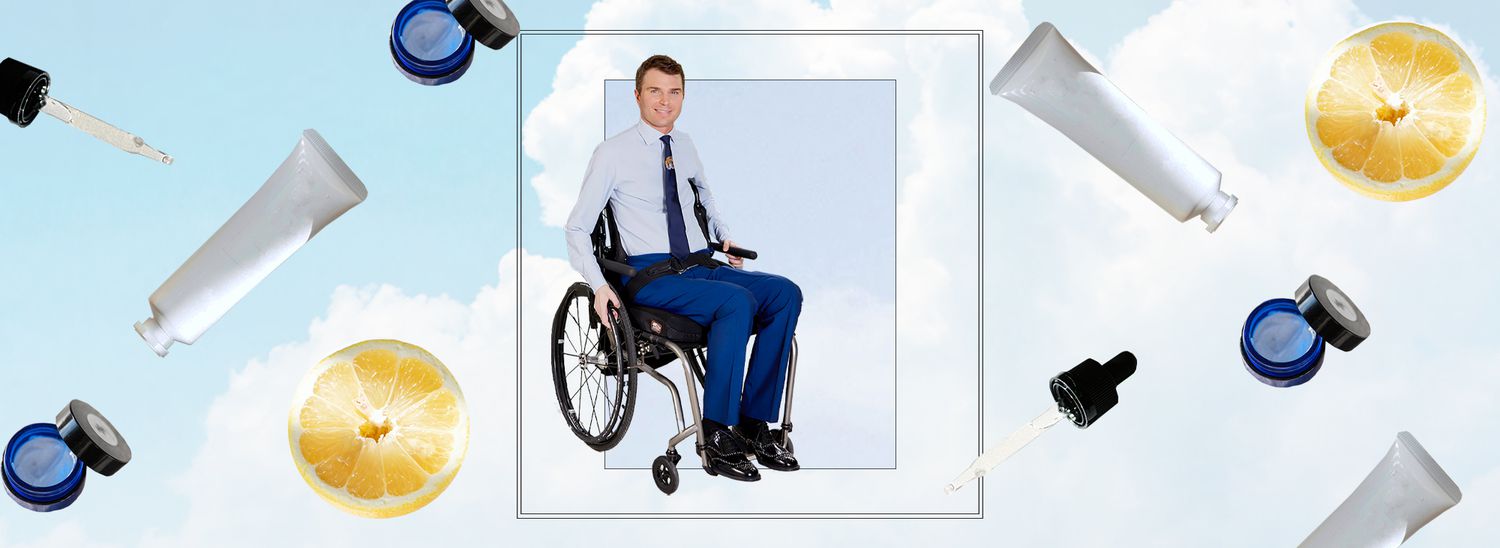

:max_bytes(150000):strip_icc()/skincare-embedded-horiz-cb0c435badc942558446ca698f1266bc.jpg)
